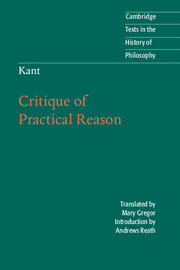Conclusion
from Part II - Doctrine of the method of pure practical reason
Published online by Cambridge University Press: 05 June 2012
Summary
Two things fill the mind with ever new and increasing admiration and reverence, the more often and more steadily one reflects on them: the starry heavens above me and the moral law within me. I do not need to search for them and merely conjecture them as though they were veiled in obscurity or in the transcendent region beyond my horizon; I see them before me and connect them immediately with the consciousness of my existence. The first begins from the place I occupy in the external world of sense and extends the connection in which I stand into an unbounded magnitude with worlds upon worlds and systems of systems, and moreover into the unbounded times of their periodic motion, their beginning and their duration. The second begins from my invisible self, my personality, and presents me in a world which has true infinity but which can be discovered only by the understanding, and I cognize that my connection with that world (and thereby with all those visible worlds as well) is not merely contingent, as in the first case, but universal and necessary. The first view of a countless multitude of worlds annihilates, as it were, my importance as an animal creature, which after it has been for a short time provided with vital force (one knows not how) must give back to the planet (a mere speck in the universe) the matter from which it came.
- Type
- Chapter
- Information
- Kant: Critique of Practical Reason , pp. 133 - 136Publisher: Cambridge University PressPrint publication year: 1997
- 1
- Cited by

